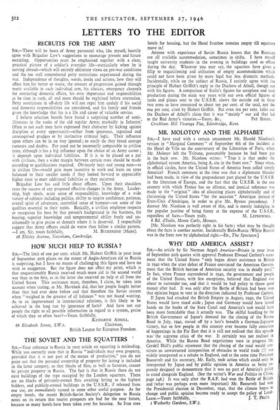LETTERS TO THE EDITOR
RECRUITS FOR THE ARMY
Sta,—There will be hosts of Army personnel who, like myself, heartily agree with Brigadier Low's suggestions to encourage present and future recruiting. Opportunities must be emphasised together with a clear, practical picture of a soldier's everyday life—particularly when he is serving abroad—which will entirely obliterate views on pre-war conditions and the too well remembered petty restrictions experienced during the war. Independence of thoughts, words, deeds and actions, how they will affect him for better or worse the amount of progression gained through merit available in each individual arm, his choices, emergency channels for contacting domestic affairs, his own importance and responsibilities as he rises in rank, all and more should be explained before attestation. Petty restrictions in off-duty life will not repel him unduly if his social and domestic responsibilities are considered, and his family and friends given the knowledge that his is a life and career of valuable service.
I believe selection boards have found a surprising number of semi- illiterates in the ranks of the old regular Army, markedly in Infantry.' Often as not such men have expressed their character by kicking against discipline at every opportunity—either from ignorance, ingrained and unrecognised grudges or by instinctive criminal logic. Their influence upon others can be in no way ignored; so easily do they breed corrupt rumours and doubts. Pay need not be necessarily comparable to civilian rates, although it has a big influence upon the choice of an Army career ; it depends upon individual liabilities. If it is to be placed on a par with civilians, then a wider margin between certain rates should be made according to qualifications required. Obviously boys and young men—as in civilian life—would gain more incentive to work and learn on rates balanced to their smaller needs if they looked forward to appreciably higher rates to meet additional liabilities as they occurred.
Brigadier Low has said little about officers. Upon their shoulders rests the success of any proposed effective changes in the Army. Leader- ship, high ideals, acute sense of responsibility, knowledge of a wide variety of subjects including politics, ability to inspire confidence, patience, overall spirit of adventure, controlled sense of humour—are some of the qualities essential to their ranks. Basically, a civilian employee respects or recognises his boss by that person's background in the business, his bearing, superior knowledge and temperamental ability freely and un- ashamedly to give praise or demerit where it is deserved. I respectfully suggest that Army officers could do worse than follow a similar pattern.
—I am, Sir, yours faithfully, M. BUCKERIDGE (Major). 26 Eltisley Avenue, Newnham, Cambridge.


























 Previous page
Previous page